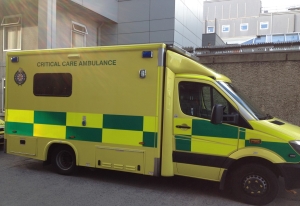Right patient, to the right care, in the right condition, in the right time
The National Transport Medicine Programme (NTMP) is one of the clinical programmes and was established in 2012.
The programme brings Critical Care, Anaesthesia, Emergency Medicine, Acute Medicine, Acute Surgery, Paediatrics, Obstetrics, Neonatology, Nursing and Midwifery, National Ambulance Service (NAS), Primary Care and Patients together under a single programme structure.

Over the last four years the NTMP has successfully championed the development of retrieval services for seriously ill infants, children and adults throughout Ireland. The programme is all about the timely retrieval/transfer of critically ill or severely injured patients by appropriately trained and skilled teams of healthcare professionals, who get the right patient, to the right care, in the right condition, in the right time.
Transfer of a patient occurs from a referring to a receiving hospital. Low acuity patients are transferred by NAS and by private ambulance services. Higher acuity patients are additionally accompanied by a nurse, and when required, a physician from the referring hospital.
The NTMP is currently undergoing root-and-branch reform which will see it become a service, within the HSE, in the coming year. This is in tandem with increased delivery of services across participating hospital groups.
Achievements to date
- Expansion of the neonatal service, operating since December 2013 on a 24/7 basis.
- 5000th baby transported by the National Neonatal Transport Programme (NNTP) in November 2016.
- Irish Paediatric Acute Transport Service (IPATS) pilot in operation since October 2014 on a 10:00 hrs to 20:00 hrs, Monday to Friday basis, with plans to move from 10:00 hrs to 22:00 hrs by early 2017.
- National survey of adult critical care patient movement from model 2 to 3 and from model 3 to model 4 hospitals undertaken in 2015.
- The NTMP is facilitating the Hospital Grouping Strategy on a national level; they are benefitting from the service expansion.
- Better care is being delivered with improved patient outcomes, improved patient safety and quality of service, since the establishment of the programme.
- Two new purpose designed critical care vehicles to support delivery of services to patients due for commissioning in the coming weeks.
- Recruitment and retention tool for nursing/medical staff.
- Joint working collaboration for nurses in Our Lady’s Children’s Hospital Crumlin (OLCHC) and Temple Street Children’s University Hospital (TSCUH), supporting integration to the new National Children’s Hospital (NCH).
- National Outreach Education programme being delivered by the adult, paediatric and neonatal teams to regional hospitals, supporting collaborative working, standardisation and team working within hospitals, and within hospital groups. All hospitals are receiving the same training course.
- Over 500 individuals have been trained on the neonatal, paediatric or adults courses in 2016.
- Mobile Intensive Care Ambulance Service (MICAS) South pilot 3 days per week from Cork University Hospital.
- IPATS carried out 92 retrievals from Jan – Nov 2016.
- MIICAS carried out 95 retrievals from Jan – Nov 2016, increase of almost 40% in two years.
- NNTP carried out over 600 from Jan – Nov 2016.
- ePCR for IPATS being piloted early 2017.
- New website to be launched January 2017.
Next steps for 2017
- Process to transition from a programme structure to an operational service
- The establishment of a National Retrieval Coordination Desk
- The establishment of a single telephone number for all Retrieval requests
- The hosting of a National ‘live’ Critical Care Bed-Bureau
.jpg)